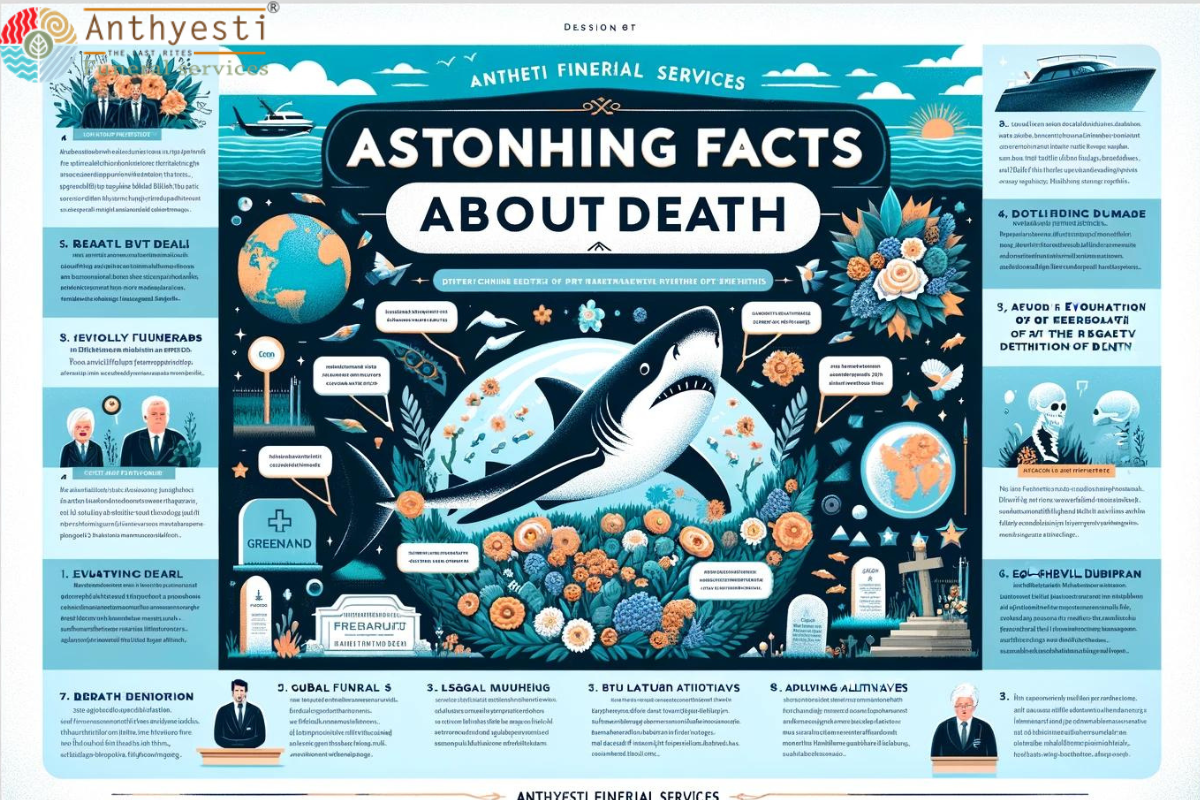Astonishing facts about death
In every culture, across every era, death remains one of the most profound constants of human existence. Yet, despite its inevitability, death often remains shrouded in mystery and imbued with an array of fascinating facts and figures that many may not be aware of. At Anthyesti Funeral Services, we believe that understanding death better can help us appreciate life more fully. Here are some astonishing facts about death that provide insight into this inevitable part of our journey. Astonishing facts about death.
1. The Concept of Brain Death
Brain death, which is the complete and irreversible loss of brain function, is a relatively modern medical definition of death that has only been recognized in the last half-century. It is distinct from vegetative states or comas, where some brain functions may remain. This definition helps families and medical professionals make informed decisions about organ donation and end-of-life care. Astonishing facts about death.
2. The Environmental Impact of Burials and Cremations
Traditional burial and cremation methods can have significant environmental impacts. Burials often involve embalming fluids, which can leach into the earth, and the decay of wooden coffins contributes to methane production. Cremation releases carbon dioxide and trace elements like mercury into the atmosphere. Consequently, there’s growing interest in eco-friendly burial options, such as biodegradable coffins and cremation alternatives like alkaline hydrolysis, which uses less energy and produces fewer emissions.
3. The Death Clock and Death Rates
Statistically, about 55.3 million people die each year worldwide, which breaks down to about 151,600 people per day, or 105 people each minute. Tools like the “Death Clock” can use statistical data to predict the likely date of a person’s death based on factors such as lifestyle, health conditions, and demographic data, though they are not precise predictors.
4. Cultural Practices Around the World
Cultural responses to death vary dramatically around the world. For instance, Tibetan sky burials involve placing the deceased on a mountain top to decompose naturally or to be eaten by birds of prey, reflecting a belief in the transitory nature of physical life. In Madagascar, the tradition of “famadihana” or “turning of the bones” involves exhuming the wrapped bodies of ancestors, rewrapping them, and dancing with the bundles to live music.
5. Legal Definitions and the Right to Die
The legal definition of death has significant implications, affecting everything from inheritance laws to ending life support. Additionally, the right to die, a legal and ethical concept involving euthanasia and physician-assisted suicide, is a subject of intense debate and varies significantly by jurisdiction.
6. Unusual Death Phenomena
Certain rare phenomena associated with death can be startling. For instance, “Lazarus syndrome” is a rare occurrence where a person spontaneously returns to life after attempts at resuscitation have failed. Although it’s extremely rare, it challenges our understanding of the dying process.
7. The Science of Decomposition
Decomposition begins around four minutes after death, starting a process called autolysis, or self-digestion. Factors such as environment, body size, and cause of death can influence the rate of decomposition, which is why forensic scientists can use the state of a body to estimate the time of death in unexplained cases.
8. Posthumous Body Contributions
The human body can still be useful after death. For example, a single donor can save up to eight lives through organ donation and improve many more through tissue donation. Moreover, bodies donated to science contribute significantly to medical research and education.
9. The Digital Afterlife
In today’s digital age, our online presence can continue long after physical death. Digital afterlife services can maintain a person’s social media profiles, send out messages posthumously, or store digital versions of a person’s memories. This raises important considerations about digital legacy and personal identity.
10. Mortality and Morality
Philosophically, the awareness of mortality has been a central theme in shaping human behavior and ethics. Many philosophers argue that consciousness of death can lead to a more meaningful life, a principle that plays a significant role in existentialist philosophy.
Conclusion:
Death, a subject often avoided in conversation, is rich with intriguing facts and insights that challenge our perceptions and provoke thoughtful discussion. At Anthyesti Funeral Services, we aim to provide not only respectful care in times of loss but also education that helps demystify death and promotes a deeper appreciation of life’s value. Understanding these aspects of death can change not only how we approach the end of life but also how we live each day.
For more information or assistance with funeral services, please contact Anthyesti Funeral Services. We are here to support you through life’s final journey with dignity and respect.
FAQ’s:
1. What is the longest lifespan of any living organism?
- The Greenland shark is believed to have the longest lifespan of any vertebrate on Earth, with estimates suggesting it can live over 400 years.
2. What are some unique funeral practices from around the world?
- Different cultures have unique ways of honoring the deceased. For example, Tibetan sky burials involve placing the body on a mountaintop to decompose naturally or be eaten by birds. The Malagasy people of Madagascar practice ‘Famadihana,’ where they exhume, rewrap, and dance with the bones of their ancestors to live music.
3. How do traditional burial methods impact the environment?
- Traditional burials often involve embalming chemicals that can contaminate the soil, while cremation releases carbon dioxide and other emissions into the atmosphere. These concerns have led to the rise of eco-friendly burial options.
4. How has the legal definition of death changed over time?
- The legal definition of death has evolved from the cessation of heartbeat and breathing to include a neurological definition—irreversible cessation of all brain activity—due to advances in medical technology.
5. What changes are occurring in the death care industry?
- The death care industry is adapting to digital advancements and changing preferences, including online memorials, virtual funerals, and digital legacy planning, allowing for remote participation and planning.
Call us at +91-98833-18181

